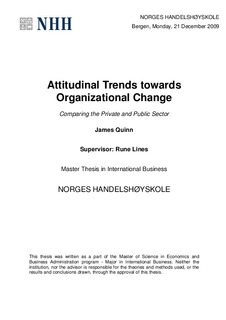Attitudinal trends towards organizational change: comparing the private and public sector
Master thesis
Permanent lenke
http://hdl.handle.net/11250/168835Utgivelsesdato
2009Metadata
Vis full innførselSamlinger
- Master Thesis [4372]
Sammendrag
Resistance to change is commonly cited as one of the largest contributing factors to the failure of planned change programs within organizations. Historically seen as a negative factor, the natural and healthy responses employees experience during a change process are now understood to be far more complex than previously thought. Attitudes and emotions comprise a large portion of what influences an employee's responses, and by better understanding what causes them to be formed and how to manage them, a smoother change process can be implemented.
A framework for analysing these attitudes and emotions has been developed by Rune Lines, and upon which this research is based. Using his framework the researcher has narrowed the focus down to the similarities and differences between the attitudinal responses of employees in public and private organizations with the intent of identifying key issues in order to better foster further research..
Quantitative and qualitative data collection was carried out with a number of organizations, from which two main points were identified. Firstly that public organization employees are more likely to suffer from negative emotions (namely frustration) due to lack of autonomy when change decisions are made. Secondly, there exists a pervasive 'Public' culture, that while difficult to neatly label, hampers change processes and leads to a certain element of inefficiency in public organizations.
Unsurprisingly, strong communication and leadership from the management behind the change process is hugely important in determining the success of the change for both private and public organizations.
